REMEMBERING G. KUPPUSAMY
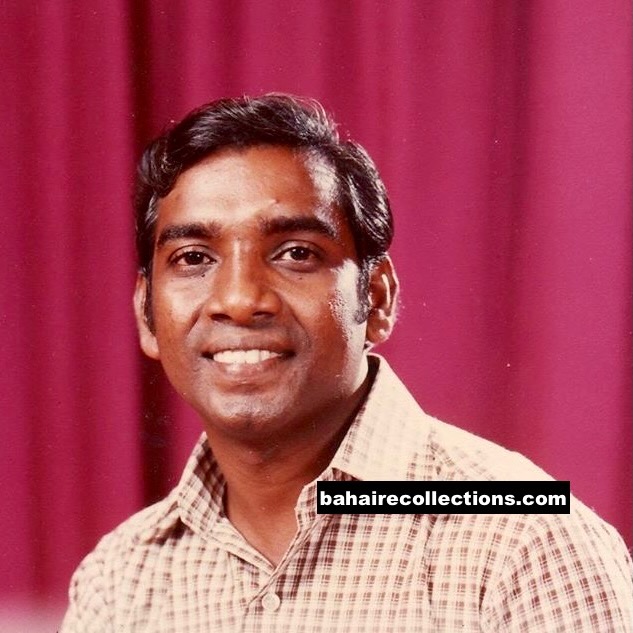
23 July 1947 – 31 March 2003
Here is a story of Kuppu, a simple youth from humble beginnings who dedicated his entire life as soon as he embraced the Cause of Baháʼu’lláh at a very tender age. Today he is remembered as one of the legendary figures in the history of the Faith on account of his selfless and sacrificial services rendered.
It was through dramatic turn of events that Kuppusamy Gopal, later known as Kuppu, came into the Faith. In August 1966 Mr. Firaydun Mithaq, a pioneer from Iran to Laos came to attend a summer school held in Port Dickson. After the summer school he stayed on to assist in teaching activities in the Masjid Tanah area in Malacca state and around Seremban town. In September 1966, Lily Ng, a daughter of Yankee Leong, the first believer of Malaya living in Seremban town and Mr. Firaydun went on a teaching trip to the rubber plantation settlements or estates around Seremban. They boarded a public bus in Seremban town to go for estate teaching in Kombok Estate, ten miles away from Seremban. While on the bus they befriended Kuppu, then a student studying in Seremban who was returning home to Kombok Estate after school. As the bus was crowded, Lily Ng sat next to Kuppu while Firaydun sat in the front seat and turned towards Kuppu to converse. The three entered into a casual conversation. Kuppu was a bit surprised to see a white coloured man and a Chinese lady traveling together. They enquired where Kuppu was going, and he replied that he was returning to his home in Kombok Estate after his school. Lily Ng and Firaydun informed him that they too were going to the same estate. Kuppu out of great curiosity inquired about the purpose of their visit to his estate, and Firaydun answered that they were going to share the teachings of a new religion called the Baháʼí Faith. That was the second time Kuppu had heard of the Faith. The first time was when he was about thirteen years old from a friend who had accompanied his uncle for a Baháʼí fireside. And that friend informed Kuppu that there were mixed races at the fireside who prayed in many languages and there was also plenty of food. That was all that Kuppu heard of the Faith. Kuppu was not impressed at that first time as he was looking for a religion that would satisfy his needs. He had earlier attended meetings of several other religions and pondered why all the religions came from one God, and yet man was so disunited. Kuppu was always the last to leave the gatherings of other religions after having private conversations with the speakers. Somehow the speakers did not give Kuppu the freedom to ask all the questions that he wanted to. But the second time he came across the Faith, Kuppu asked for more details about the Baháʼí Faith. Lily started to speak out but the noise of the engine of the bus and traffic made it difficult for Kuppu to make out what she was saying. Firaydun who observed this immediately handed over to Kuppu a Baháʼí pamphlet. For the next half an hour Kuppu was engrossed in reading it word for word absorbing everything that was printed on the pamphlet. Kuppu was very touched by the teachings and impressed especially by the twelve principles of the Faith and thought to himself that was what he was looking for and wanted to be a Baháʼí there and then. But he did not know how he could become a Baháʼí.
As the bus was arriving at the destination, Kuppu asked if the two Baháʼí teachers could visit his home and meet his family. They were happy to get the invitation, but informed Kuppu that they had already taken up a prior appointment to meet some school teachers in the Tamil Primary School in the estate. As they alighted from the bus at the entrance to the Kombok Estate, Kuppu led them to the Tamil school where the teachers were starting to gather for the fireside. Kuppu asked the Baháʼí teachers if he too could join in the fireside, which they gladly welcomed.
The excited Kuppu ran home fast, dumped his school bag in one corner and rushed back for the Baháʼí meeting without even taking lunch, with his mother shouting away not knowing what came of her son. At the fireside Lily spoke on the Faith, and the teachers raised many questions to which Lily gave convincing answers. Some of those answers satisfied Kuppu but none of the teachers accepted the Faith. As it was getting late the two Baháʼí teachers started walking toward the main road to catch the return bus to Seremban town. Kuppu too followed them. At the roadside Kuppu asked if he could become a Baháʼí and asked the way to go about it. The two Baháʼí teachers were happiest. Firaydun gave Kuppu a big hug and produced a declaration paper with space for nine names, on which Kuppu entered his details and signed up. Kuppu invited them to his house to share the Faith with his parents, younger brother and sister. Although it was getting late Lily and Firaydun went to Kuppu’s house and gave the Faith. The entire family accepted the Faith. That was on 9 September 1966. That was the turning point in his life that saw many years of his sacrificial services for the Faith.
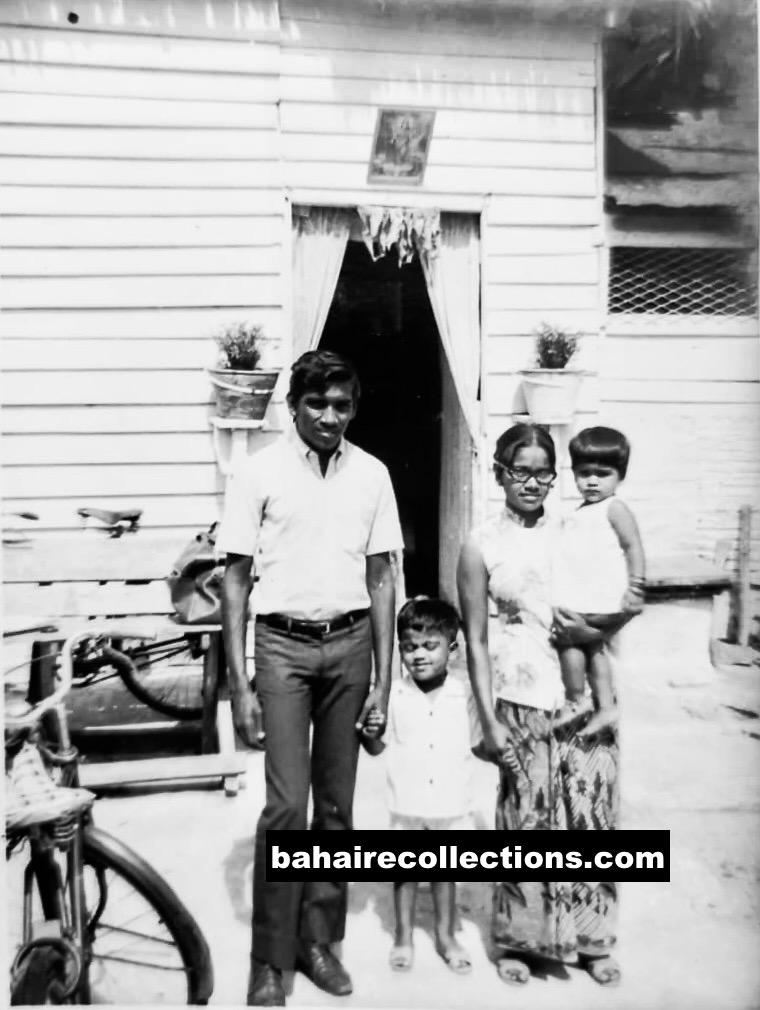
At his home in Kombok Estate
Upon accepting the Faith, Kuppu immediately set out promoting the Faith within the Kombok Estate. With his robust teaching efforts, a Local Spiritual Assembly was formed in that estate in 1967. The fire that was set into his heart prompted Kuppu to visit the Seremban Baháʼí Centre often to learn more about the Faith from the elders of Seremban including Yankee Leong and S. Satanam and through the several Baháʼí gatherings held in the Seremban Baháʼí Centre. He got hold of any Baháʼí literature available and read widely. His favourite Baháʼí subject was history and the Baháʼí Administrative system. He also befriended many friends and took public bus to go for teaching in some places in Negeri Sembilan state. He was often in the company of Yankee Leong in those teaching trips.
After his studies Kuppu moved to Malacca town where he took up a temporary job as a Tamil school teacher in the Bukit Baru area. In Malacca too Kuppu started to get involved in local teaching activities. His frequent meeting with Malaysia’s first Auxiliary Board member Mr. Leong Tat Chee in Malacca was one more factor that propelled him to rise higher in service and become ready to sacrifice for the Cause. Leong Tat Chee gave all the words of encouragement to Kuppu to serve, and quoted from the Writings and related stories of sacrifice. In Malacca Kuppu also befriended one Stanley Raj with whom he went teaching, along with C. Kanagaratnam from Bahau who was in Malacca for teaching activities.
Kuppu was deeply moved when attending the first South East Asia Bahá’í Regional Youth Conference held at the Malayan Teachers College in Kuala Lumpur in December 1968, graced by the presence of Hand of the Cause of God Mr. Abu’l-Qásim Faizi. The talks by the Hand of the Cause created strong influence in his soul. The highlight of the conference was a session on “Sacrifice and Pioneering.” When Inbum Chinniah, the Secretary of the National Spiritual Assembly of Malaysia spoke on the urgent need for pioneers, especially to East Malaysia, thirty-seven believers arose, and Kuppu was one of those who spontaneously arose to offer his services. But he was not to move out of the country immediately. Next, he became well-grounded through the training for pioneers offered by Inbum and Raymond Peter at the National Teaching Institute of Malacca held in February 1969.
There was a growing need for a Tamil translator at the National Office in Kuala Lumpur. In 1969, Inbum Chinniah, Secretary of the National Spiritual Assembly, needed a good Tamil-speaking person to communicate with the Tamil-speaking believers. Kuppu who was a temporary Tamil school teacher in Bukit Baru came to know of this need and had to decide between his future career and the need of the Cause. After prayerful reflection Kuppu decided to serve the need of the Faith and resigned from his teaching post. His close relatives and family members were quite shocked and surprised that he had resigned from a prestigious career that would assure a good future. Kuppu was then employed as clerk at the National Bahá’í Centre with effect from 1 October 1969. Inbum supplied the message in point form and Kuppu prepared letters in Tamil for Inbum’s signature. Such letters received from the national office in the Tamil language were not only a joy to the Tamil speaking friends, but also served to bring the National Spiritual Assembly closer to the hearts of the Tamil-speaking community. Inbum was greatly encouraged with the result and added the task of translating the Nineteen Day Feast newsletters into Tamil, which Kuppu carried out effectively. With his good command of the Tamil language, Kuppu became a great asset to the National Spiritual Assembly of Malaysia. In the one year in which Kuppu served as a clerk, he lived a very simple life at the National Baháʼí Centre, sleeping on a straw mat spread out on the floor, mostly with no pillows or blankets. Kuppu was given an allowance with which Kuppu managed his life.
While working in the national office Kuppu undertook two Asli teaching trips into the jungles with other teachers like C. Kanagaratnam and returned exhausted, lean looking, and with sores from leeches bite. And they never complained. Inbum and his wife Lily who were renting a bungalow close to the National Baháʼí Centre would invite them for dinner and nourish them generously. The Asli teaching trips had truly laid the foundation for him to perform greater works for the Cause later in the remotely placed longhouses in Sarawak.
During this period of service under Inbum Chinniah, Kuppu had developed a greater understanding of the Faith and mastered the English language with a remarkable fluency, which surprised many. When the National Bahá’í Youth Council of Malaysia organised a Conference for the South East Asia zone in Singapore in December 1969, Kuppu spoke on ‘The Administrative Order’ and was well received by the listeners with words of immense appreciation. Throughout his life his favourite topic was Bahá’í Administration and he used to deliver talks on the subject without notes.
Next came the most important phase in his life. The National Spiritual Assembly was concerned of the many goals of the Nine-Year Plan yet to be achieved in Sarawak and Sabah, and wanted to send manpower to that state. Kuppu offered to give a helping hand for Sarawak, while Vishnupatham of Seremban offered to serve in Sabah. They went to Singapore on 1 January 1970 to catch a boat to East Malaysia. But in Singapore a surprise awaited them. The boat that was to take them to East Malaysia was delayed and so they had to extend their stay in Singapore. It was during this stranded period that Hand of the Cause of God Mr. A. Q. Faizi flew from the Philippines and stopped over in Singapore for a few days enroute to Bangkok. The believers in Singapore along with Kuppu and Vishnupatham met the Hand in the new Bahá’í Centre at Hartley Grove and listened to his talk carrying stories of his visit to Australia, New Zealand, and Tonga Island. That was a spiritual rejuvenation for the two.
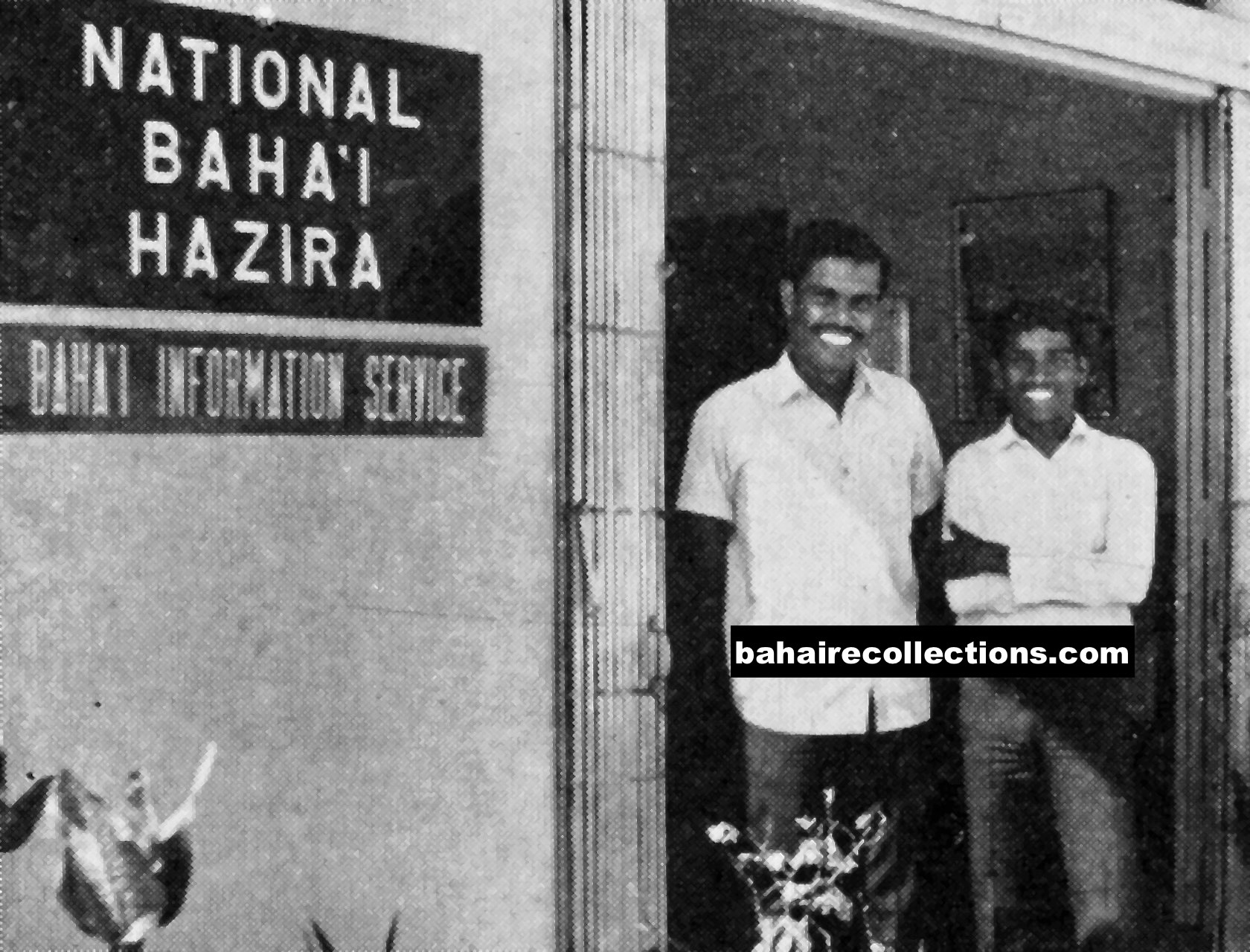
Vishnupatham and Kuppu at the National Baháʼí Centre, Setapak, Kuala Lumpur, 1969
In February 1970, they sailed from Singapore. Kuppu went to Kuching in the state of Sarawak while Vishnupatham went to Sabah to offer their services there. Kuppu was familiarising himself in the hitherto unknown Sarawak with culture shocks. Kuppu created history as soon as he came to Sarawak. Kuppu, together with other Malaysian pioneers Lim Boon Huat, and T. Rajan who came to Sarawak for teaching were instrumental in forming the first youth committees in the history of Sarawak. Those youth committees were formed in Kuching, Sibu, Kampong Lebore and Marudi. Kuppu was active in the teaching field and in opening new localities for the Faith. He brought in many youths into the Faith and trained many of them to be effective teachers of the Faith.
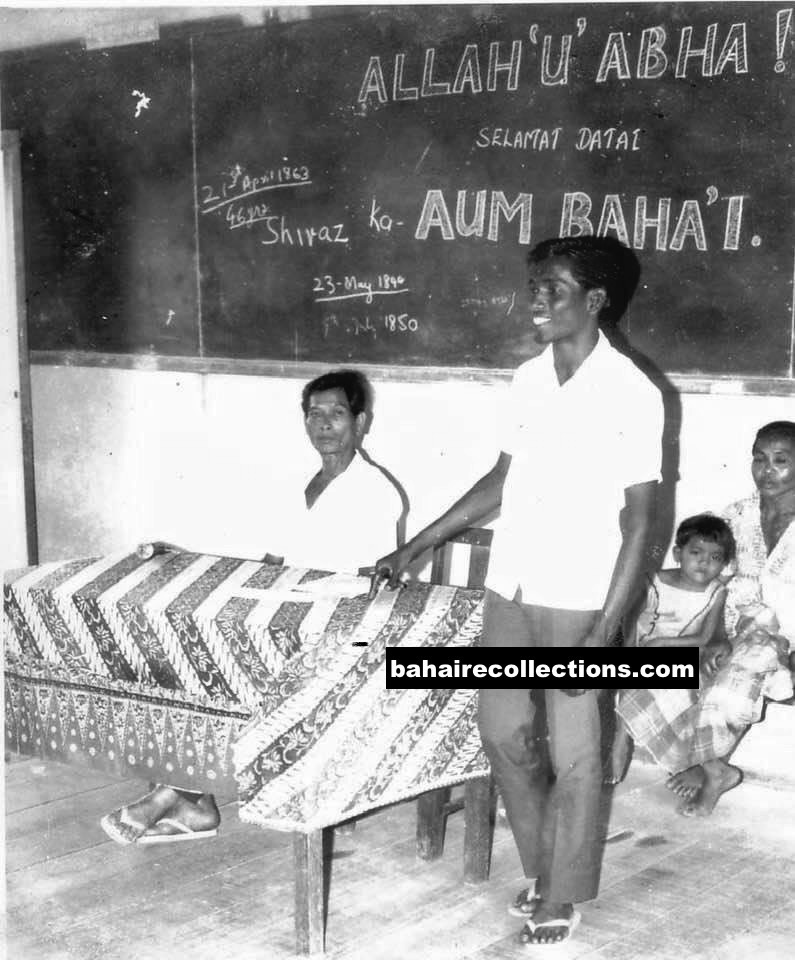
Kuppu, a simple man with simple souls, 1970
When the Oceanic Conference of South China Seas took place in Singapore in early January 1971, there was a need for someone from Sarawak to bring the Iban Baháʼís for the Conference. Kuppu was tasked to lead 19 Iban believers by boat to participate in the Conference. The Oceanic Conference in which two Hands of the Cause of God – Mr. Enoch Olinga and Mr. Collis Featherstone spoke in moving words that penetrated his soul. There were other moving moments as well, especially pioneers relating their stories.
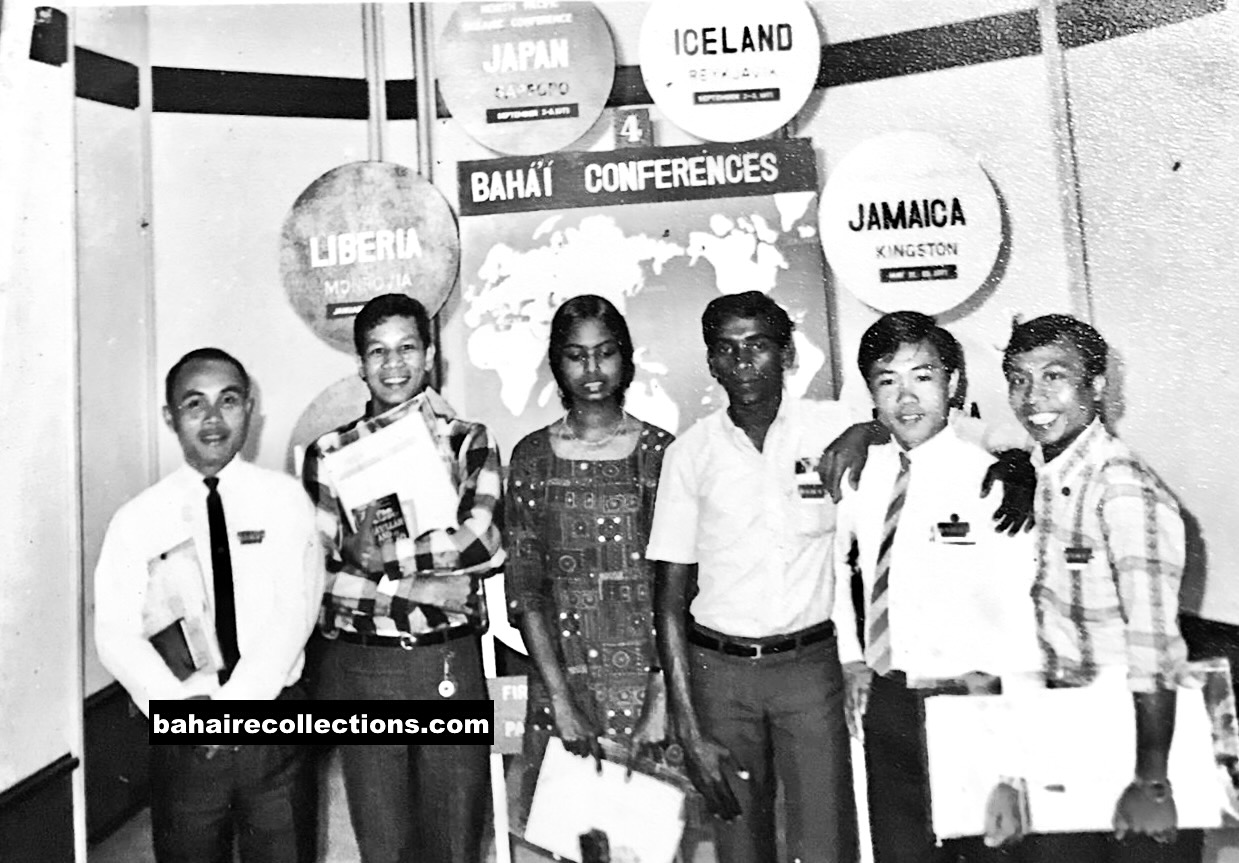
Oceanic Conference. L-R: Smith Ottan, (first Melanau believer), McMillan Bau, Kalavathy Appuraman, Kuppu, Dido and Anggau
Following the Oceanic Conference, Kuppu returned to West Malaysia and stayed for some time visiting relatives and friends. Inbum Chinniah, Secretary of the National Spiritual Assembly requested Kuppu and C. Kanagaratnam who was serving as Administrative Assistant at the National Baháʼí Centre to teach in Singapore for a month and then proceed to Sarawak. After a month of teaching in Singapore, they proceeded to Sarawak. Joining them was T. Rajan from Malacca community. Rajan, being a strict vegeterian found it difficult to go on with his food restrictions and returned to Malacca. Kanagaratnam was there for six months before returning to Kuala Lumpur. But Kuppu remained in Sarawak as he saw the vast needs to serve the Cause in Sarawak. He then decided to bury his bones there. When Kuppu arrived he stayed in the spare room in the Baháʼí Centre in Tabuan Road, sharing with Penghulu Maniam who had arrived from West Malaysia as a pioneer. A few days after Kuppu’s arrival in Kuching he was greeted by an attack of malaria.
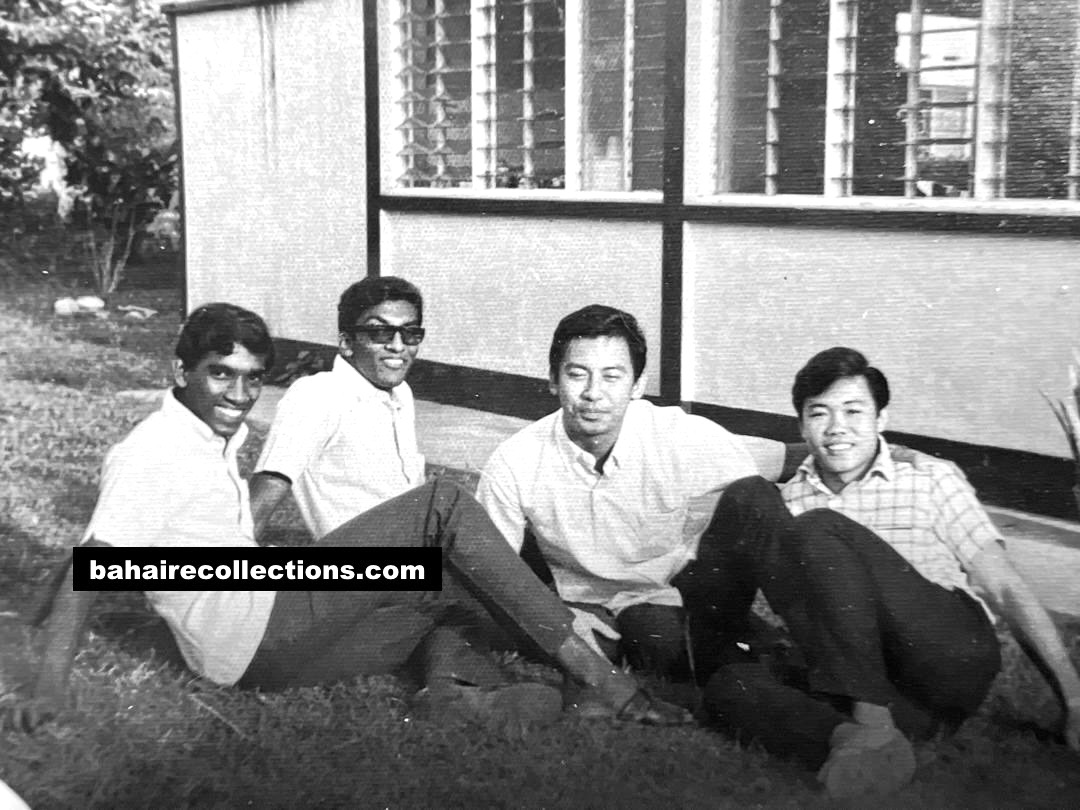
At the National Training Institute in Malacca after the Oceanic Conference. L-R: Kuppu, T. Rajan, Bobby Wee and Dido
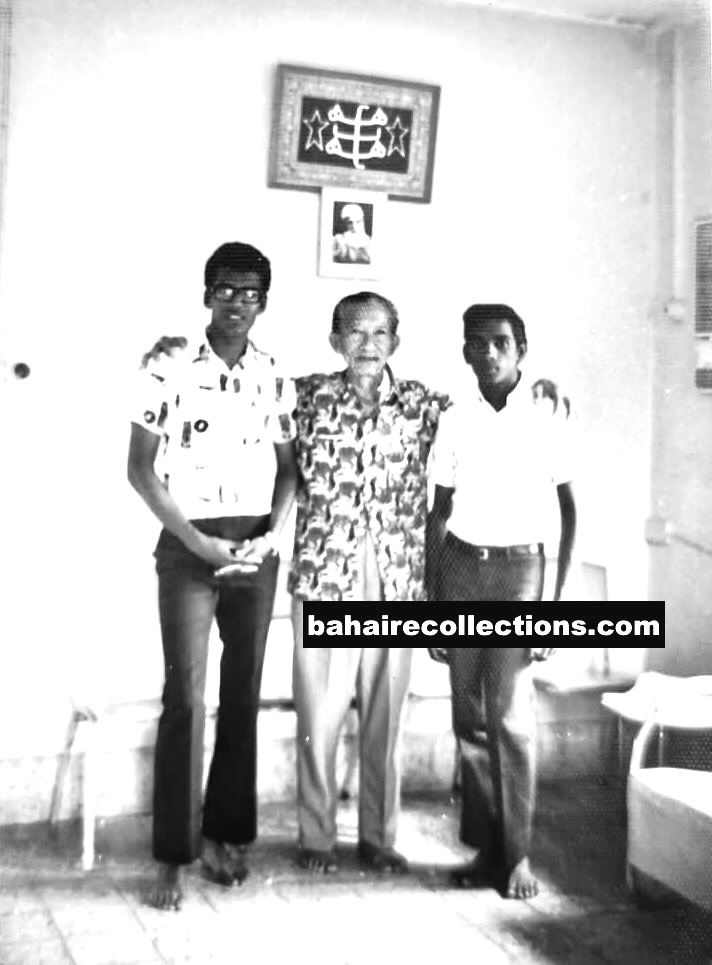
Baháʼí Centre of Singapore at Hartley Grove. L-R: C. Kanagaratnam, Yankee Leong, and Kuppu
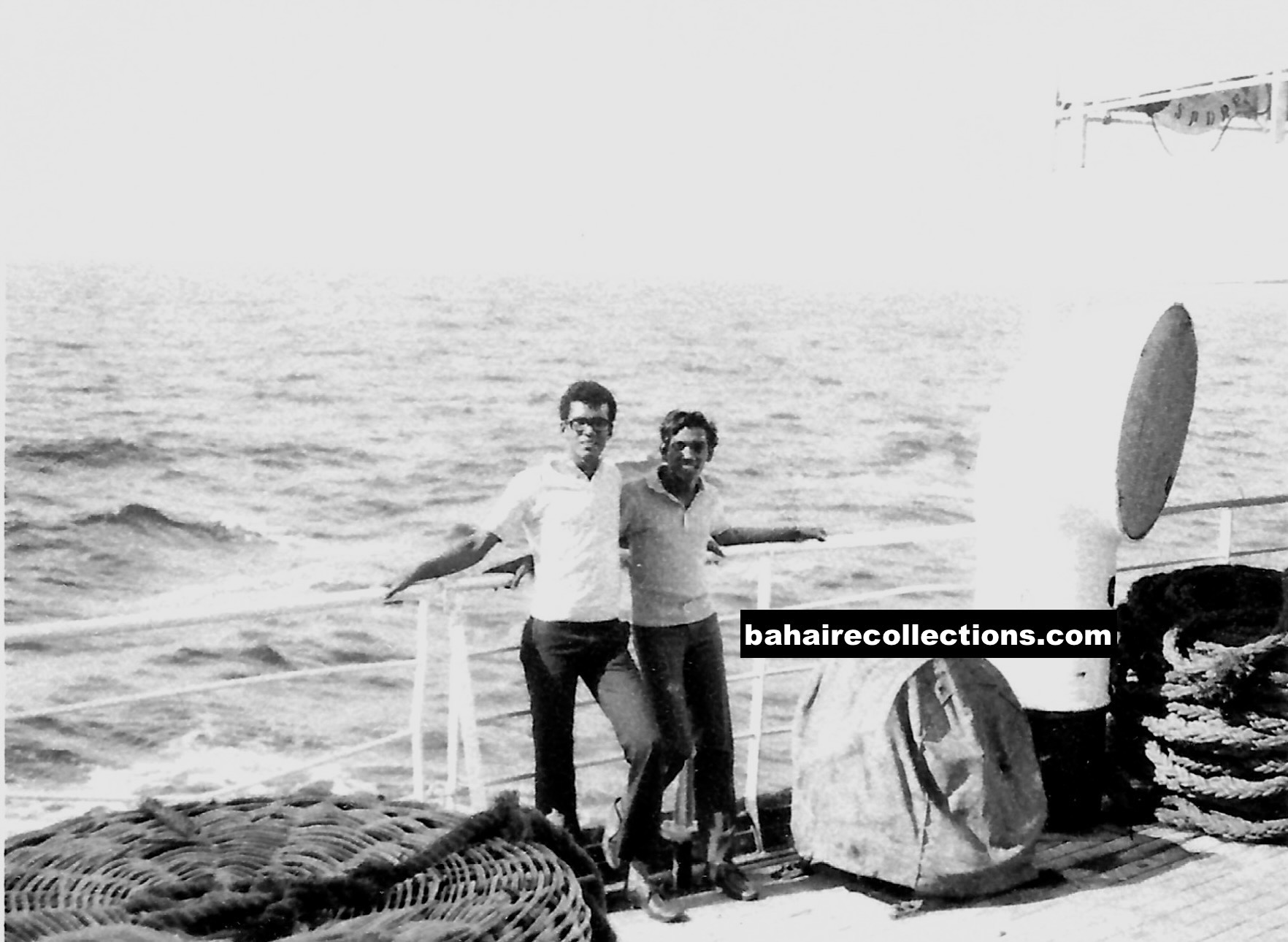
C. Kanagaratnam (L) and Kuppu (R) on boat to Sarawak, 1971
In Sarawak, Kuppu had the privilege to be further trained and guided in the Faith by Dr. John Fozdar, whom he greatly admired for his deep knowledge, commitment and dedication for the Faith. His wife Grete Fozdar was an Auxiliary Board member from 1968 and the arrival of Kuppu was an asset for her as he gave all the assistance for her activities and plans as a Board member. She too depended to a large extent on the feedback Kuppu brought for her from his extensive field travels. He was excellent in detecting issues and problems in the communities he visited and was quick to report them to the institutions. Whenever Kuppu came back from the interiors to Kuching he stayed in the quarters of Dr. John Fozdar, as one of their family members. He was independent and free to come and go as he liked. He would exchange information with the Fozdar family in their comfortable sitting room. Kuppu organized many deepening sessions for the youth at the residence of Dr. John and at the Baháʼí Centre in Tabuan Road as well.
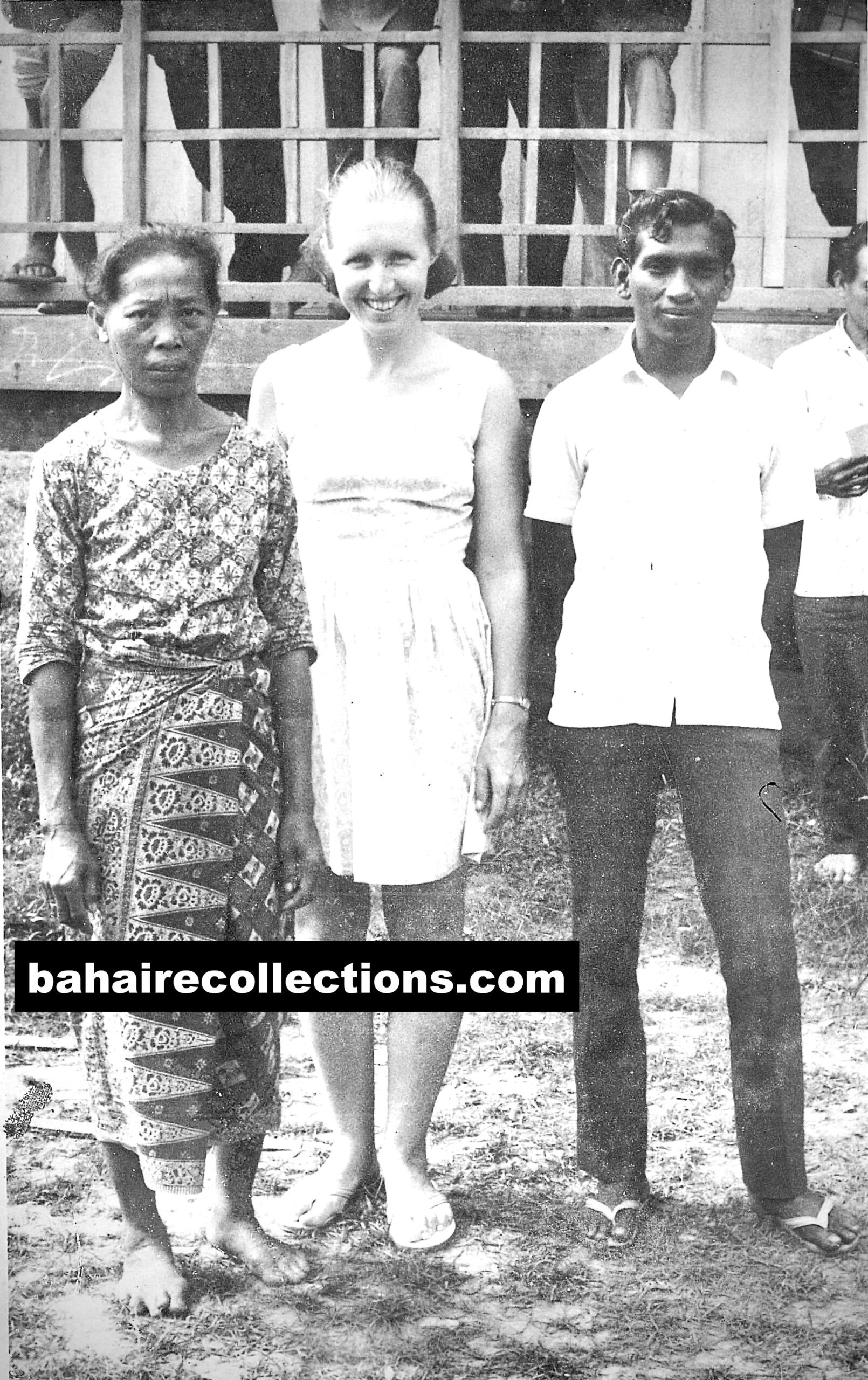
Board member Grete Fozdar in the centre with Kuppu at right with a native believer
Kuppu, along with Penghulu Maniam played a great role in deepening the native Iban believers in several parts of Sarawak. As was the case with Maniam, it would be difficult to relate each and every activity of Kuppu. Suffice to say there was no part of Sarawak that Kuppu had not visited, and likewise no believer who had not heard of Kuppu during his eleven years of residing in Sarawak. He had visited some of the interior places not familiar to the long-time residents of Sarawak.
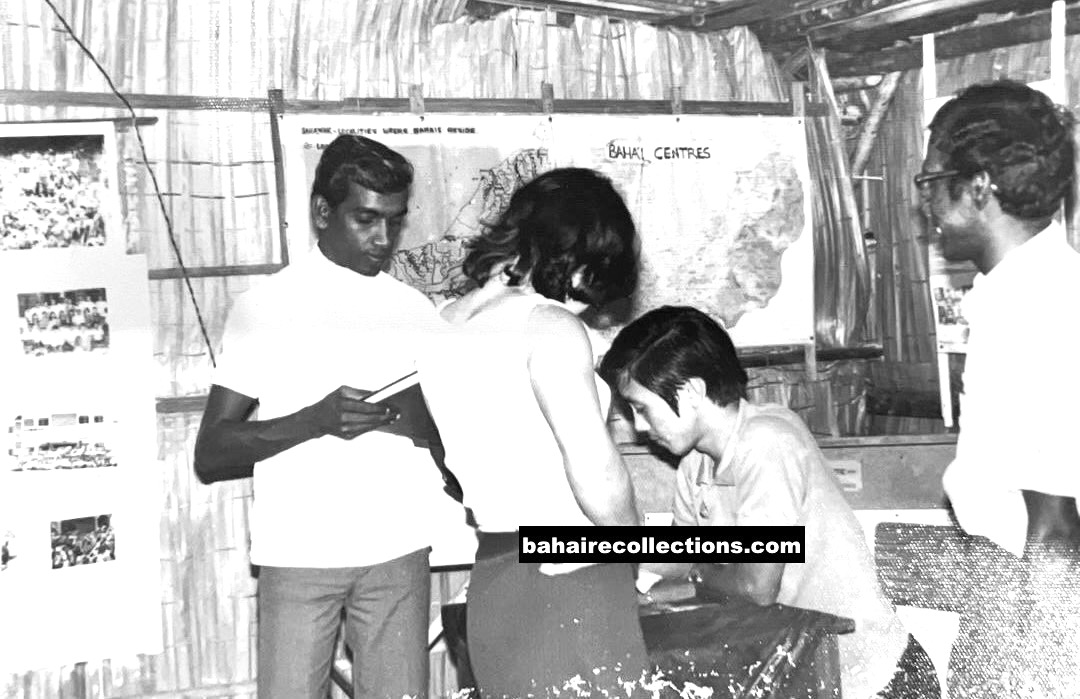
Kuppu at the extreme left at the Bahá’í Exhibition held during the Kuching Annual Trade Fair, 1972. Seated is Tay Yang Huang
One of the first major activities of Kuppu was a historical event for Sarawak. It was the first State-wide Conference held in the Baháʼí Centre of Kuching on 18 December 1971, with representatives coming from Sabah and Brunei as well. Dr. John Fozdar and Kuppu chaired the conference, which had talks presented in the Malay or Iban language. The second day was for Unit Convention to elect delegates for the National Convention. Much lively deliberations pervaded the Unit Convention.
Throughout the 1970s to the 1980s Kuppu visited Sri Aman and the neighboring communities for his many teaching activities. He was one of those who laid the foundation to establish several Assemblies, including the Assembly of Sri Aman. To this day he is fondly remembered for the ‘Army of Light Campaign’ of 1973 in which he actively participated in the towns of Miri, Bintulu and Sibu. Many embraced the Cause through the sincere work of Kuppu. In December 1974 too Kuppu was leading teaching groups in Miri and Limbang.
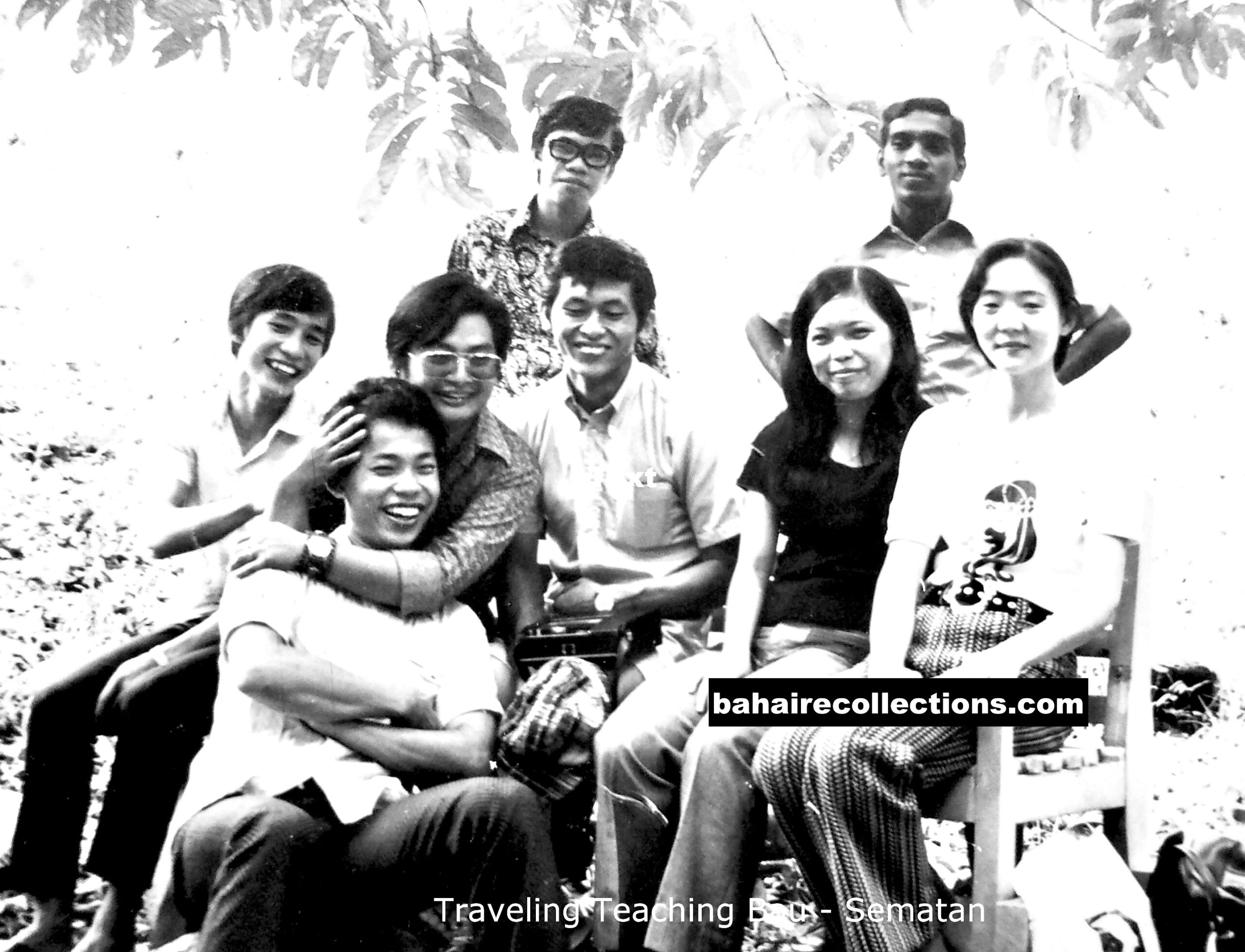
Travel Teaching in Bau, Sematan. L-R: Raymond Song, Chong Kim Hin, John Chong, Choo Tze Fen, (unknown lady) and Ms Ang. Standing at back row right is Kuppu
While in Sarawak, Kuppu served effectively in teaching the Iban people in the longhouses. Kuppu had understood the spirit and the essence of the message of Baháʼu’lláh very well when he accepted the Faith. He knew only too well that to be effective in the field one has to live by the Writings. This he did when he moved with the Iban people. He used to travel for days in the thick jungles, often journeying by boats to reach the remotest longhouses to share the message of Baháʼu’lláh. And when he met them, he gave them the message with all sincerity and poured out his love for them, which they could easily detect as genuine. He then would stay with them in the long houses with the barest comfort, and partake of whatever food they provided, mostly vegetable and preserved meat, called “kasam” which had an obnoxious smell to the foreigners. But Kuppu partook of them with joy. He was careful never to offend anyone by his words or deeds, and never misused their hospitality. His departure from the longhouses back to Kuching were often tearful on both sides.
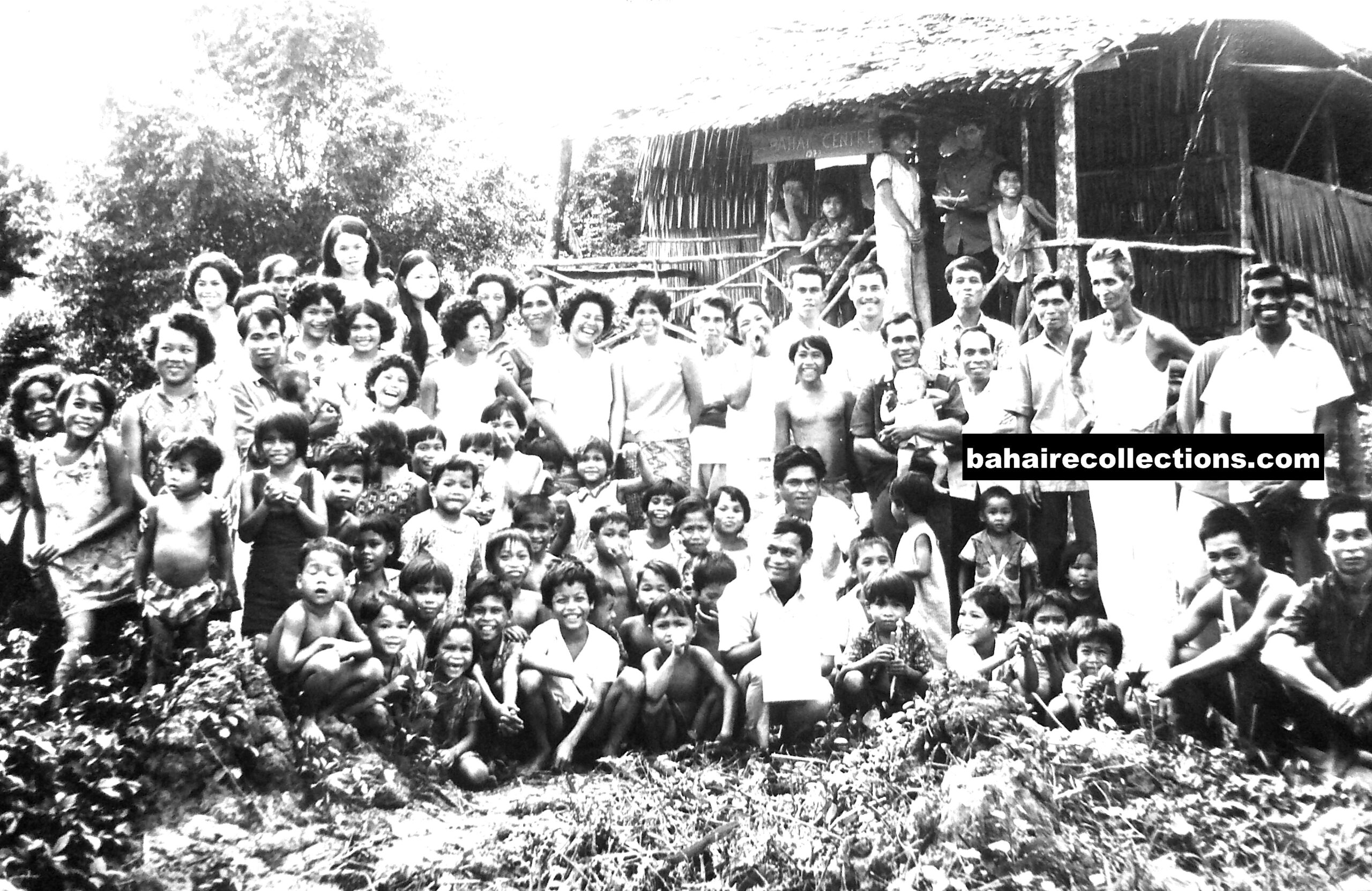
Kampong Sampun, Asajaya Conference. Kuppu standing at the extreme right as one of them
Kuppu would often undertake a few weeks of teaching in a stretch and came to develop a good command of the Iban language and it was often mentioned that he could converse as just one of them or even better as some observed. This then added to his effectiveness in the Cause in that he was able to move as one of the family members of the indigenous people, who themselves came to accept Kuppu as one of them. Whenever situations permitted Kuppu would take along first-time travel teachers from the urban areas into the jungles for teaching, and thus became a good trainer as well.
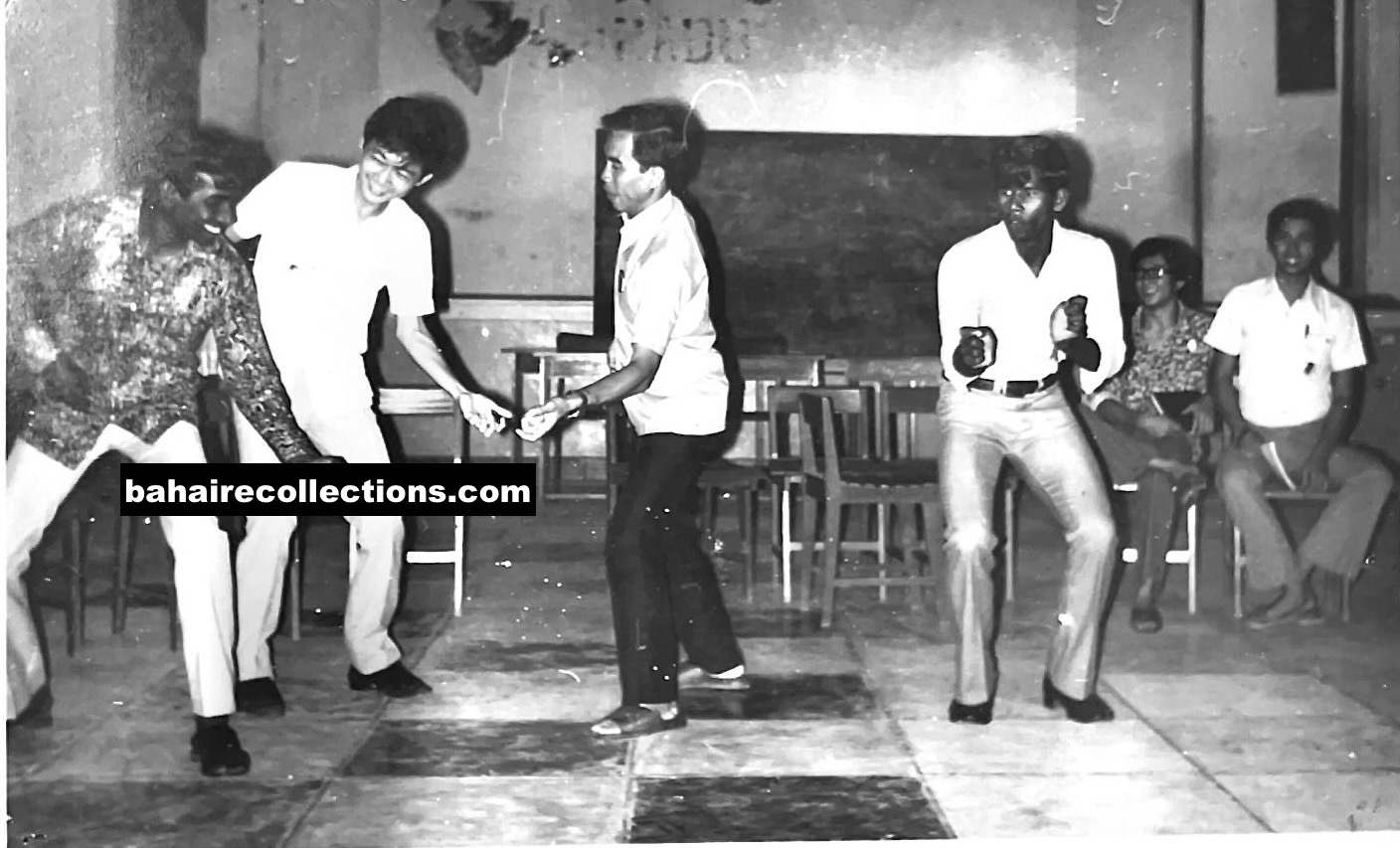
Kuppu was always there to add fun. L-R: Kuppu, Lim Pun Huat, Bugis and Ponnusamy from West Malaysia at the Winter School of 1973 held in the Government Dragon School
Kuppu had been highly successful in unventured areas as well. Several Christian missionaries were very active in spreading their teachings in the interiors and found they could not make much progress in some places. Kuppu was sent to one area monopolised for a long time by a Christian denomination which had large funds for missionary works. But when the simply clad Kuppu, with no funds at his disposal entered those very places he brought in the entire longhouses into the Faith, without offering any material benefits. News spread, and this became mind-boggling to those missionaries who wanted to get to the roots of this Baháʼí teacher. Soon they found out that he was a simple person without great academic achievement or financial means. They wondered what the secret of this simple person was in conquering hearts. Unable to contain any further their curiosity the priest came over to the Tabuan Baháʼí Centre to complain that Kuppu was trespassing what was supposed to be his own missionary territory. After lodging the complaints, the priest bought several Baháʼí books to investigate the Faith. And surprisingly the priest never came back!
It was also in the administrative field that Kuppu served with distinction. In Riḍván 1972, when the National Spiritual Assembly of East Malaysia and Brunei was formed, Kuppu was one of those elected on to this august institution in which he served well, and continued to serve on this institution for the next term as well. In 1974, Sabah and Sarawak once again became part of the National Spiritual Assembly of Malaysia. In that year Kuppu was appointed on the National Teaching Committee of Sarawak and he served as its Vice Chairman. It did not take long when in the same year Kuppu was appointed Assistant to Auxiliary Board member in East Malaysia, and in 1976 as Auxiliary Board member for Protection. With his deep knowledge of the Faith, Kuppu provided regular deepening classes, spiritualisation institutes and trainings to the youth of Sarawak.
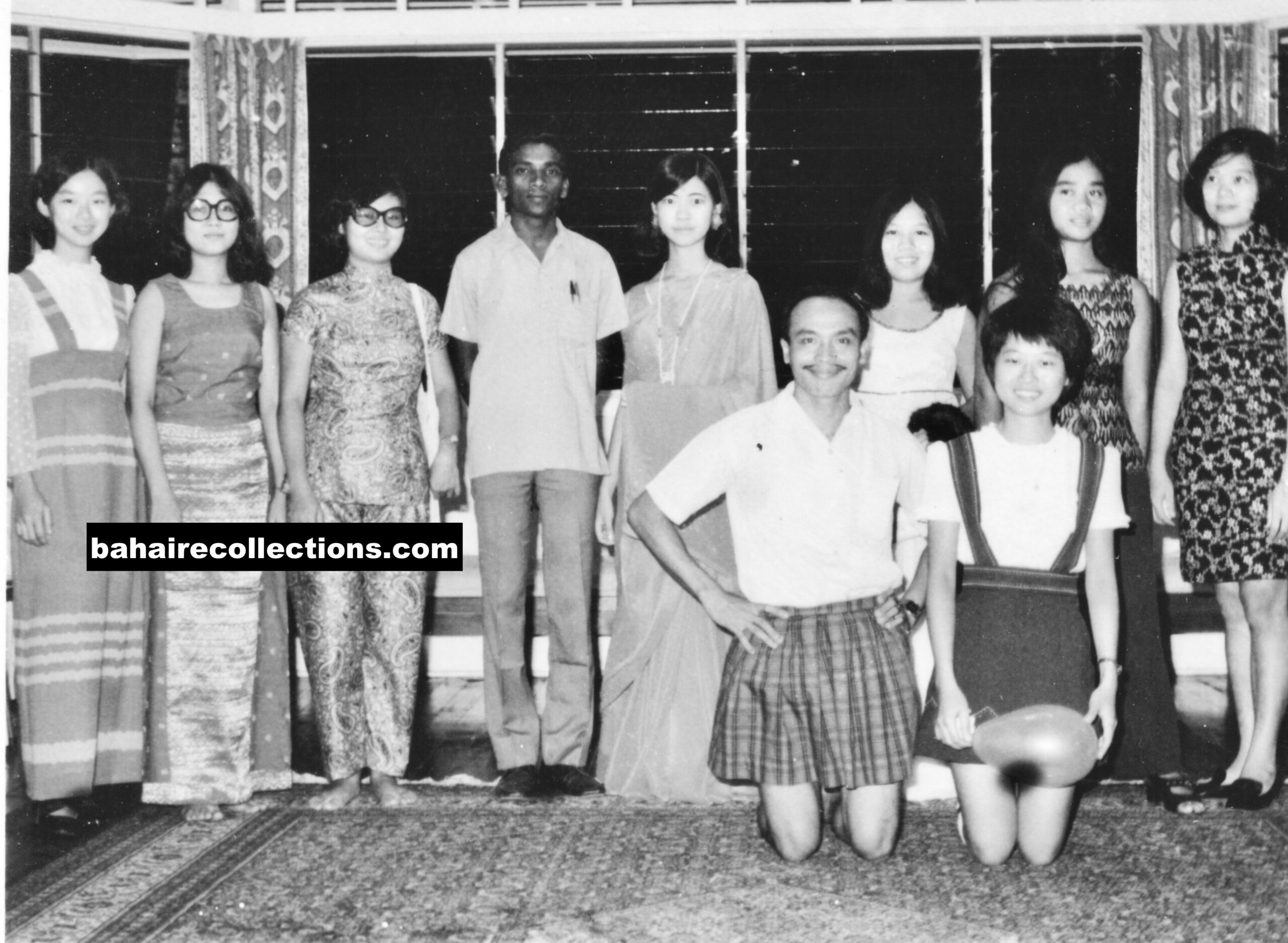
Kuppu, standing third from left and Ragai Lang, kneeling at left are the two men among the ladies at a social function at the home of Dr. John Fozdar in 1972. Vera is 3rd from right.
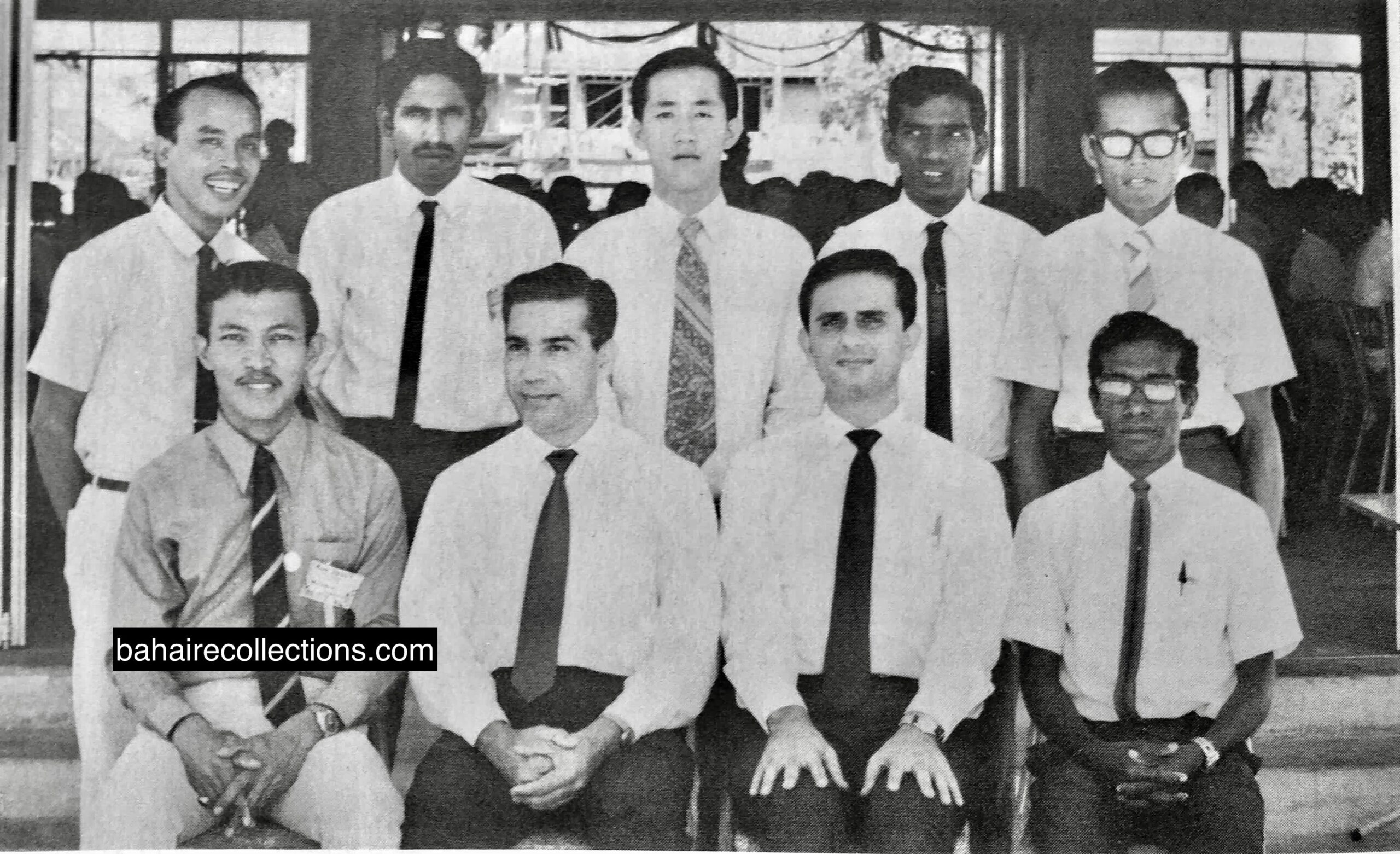
National Spiritual Assembly of East Malaysia and Brunei, 1972. Seated L-R: Choo Yeok Boon, Dr. John Fozdar, Rusi Irani and Maniam. Standing L-R: Ragai anak Lang, Thinathayallam, Lim Boon Huat, Kuppu and Sapong Andar
One important event in which Kuppu joined Mrs. Grete Fozdar and Yankee Leong was the Teaching Conference held at Sungei Nipah on 19 and 20 June 1976. While Grete as member of the National Spiritual Assembly of Malaysia and Yankee Leong as Counsellor inspired the friends with talks centring around importance of deepening in the Faith and the need to be firm when facing opposition, Kuppu as Board member inspired the gathering of 150 friends from more than 10 communities when he spoke on the six months spiritualisation plan that was designed to bring in the masses called for in the Five-Year Plan. That was the second time Yankee Leong visited Sarawak, the first being in 1962, when he and Philips Sung were the first to go into the ulus to teach the Faith. Grete and Kuppu, along with home front settler Mr. Bandih then went for the opening of the Baháʼí Centre in Rumah Moyan, Sungei Lutong, situated deep into the jungles, after a five-hour boat journey followed by two hours walk. That was on 21 and 22 June 1976. Following the opening ceremony, a One Day Teaching Conference was held that ended at 1:00 am. The three inspired the gathering which had accepted the Faith in 1963 but had been dormant until this conference in which they volunteered to teach the Cause.
When the first Regional Bahá’í Conference was held in Kuching from 16 to 19 December 1978 Kuppu gave a very moving talk on ‘Steadfastness in the Faith’ in his capacity as Auxiliary Board member. That talk was not only meant for the listeners but was something that he himself practiced till his last breath. As an Auxiliary Board member, Kuppu was invited for the official opening of some Baháʼí Centres in the interiors. Among them were the opening of the Centre in Penglayan Kejaman, Marudi district on 7 February 1978. Towards the later part of the 1970s, Kuppu was also involved in the translation of some Baháʼí literature into the local Iban language. Among those who joined Kuppu who led in the translation works were Mr. Tipik Ladi, Mr. Neilson Narong, Mr. MacMillan Bau, Mr. Suai Kirak and Mr. Bundan Liban. They had successfully translated prayers and the book called ‘Inspiring the Heart’ (Merangsangka Ati) and some material for spiritualization courses.
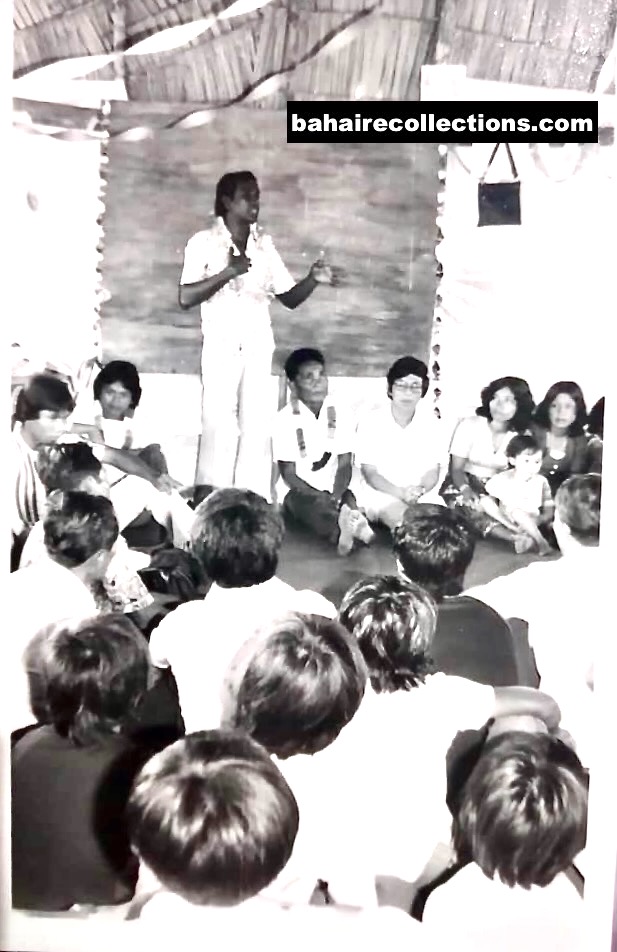
Board member Kuppu speaks at the Opening Ceremony of the Bahá’í Centre in Kejaman on 7 February 1978
At the prime of his youth, he could not get married as he always wanted to stabilise himself financially. With this background Kuppu went on serving the Cause, knowing fully well that his Creator would know what would be best for him. Thus, Kuppu gave the best part of his life for the Cause. Kuppu then decided to be self-sufficient and joined the AIA Insurance company for his livelihood and did fairly well. Kuppu divided his time between selling AIA insurance plan to support himself which also allowed him to support Baháʼí activities.
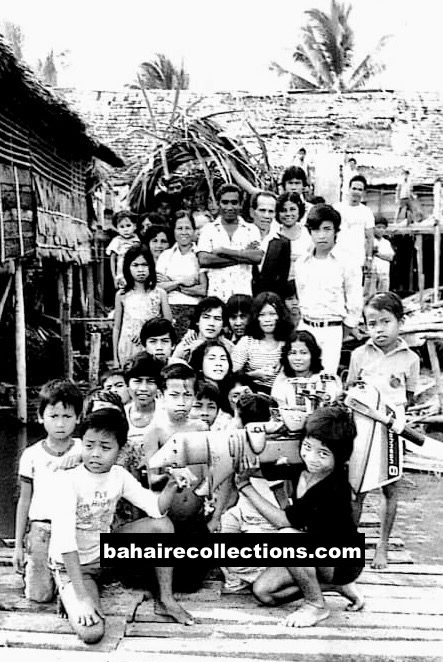
Kuppu among participants of a gathering on 2 July 1978 in Rumah Munat pf Pengalayan Kejaman
THE SABAH CONNECTION
Before moving into Sabah for good, Kuppu was making a number of trips to this place while still stationed in Sarawak. Kuppu’s first visit to Kota Kinabalu was in 1975 to meet up the Bahá’ís in Kota Kinabalu. After the departure of Auxiliary Board member Dr. Nabil Mustapha in mid-1977, Kuppu was assigned to play the role of Auxiliary Board member for Sabah and he visited Sabah often.
On 24 July 1977, a ‘Native Teaching Conference’ was held at the Kota Kinabalu Bahá’í Centre as a discussion among a group of eight Bahá’ís, mainly to deliberate on teaching the natives of Sabah. The next was the First Sabah Regional Bahá’í Conference held on 26 and 27 November in 1977 in Labuan Island off the coast of Sabah, called for by the National Teaching Committee of East Malaysia. It was attended by twenty-one Bahá’ís from eight localities. Board members Kuppu from Sarawak and Mr. Mei Siew Hong from Kedah state in West Malaysia were there along with Mrs. Grete Fozdar who represented the National Spiritual Assembly of Malaysia. The first summer school for Sandakan town was held from 7 to 9 April 1978 attended by 21 participants from 9 localities. It was held at the rented Bahá’í Centre and this summer school was graced by Board member Kuppu who at that time was in Limbang town in Sarawak.
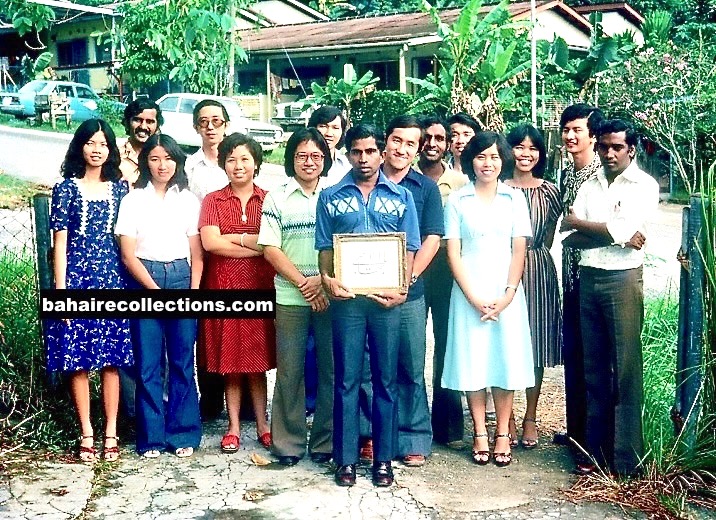
First Summer School of Sandakan, 1978. Suffayah holds the Greatest Name. Board member Kuppu stands at the extreme right. First at back row left is Dr. Janardhanan
The second Summer School for Sabah was held from 6 until 8 April 1979 at the National Park, at the foothills of Mount Kinabalu with about forty-seven participants, including 9 children from 11 communities attending. This was one more event that Kuppu attended as a Board member.The First Sabah Regional Summer School was held at Kota Kinabalu Commercial College from 12 until 14 April 1980. It was attended by 54 participants, including 8 children from twelve communities. Some fourteen friends rose to participate in the teaching campaign in Beaufort and Labuan. Kuppu graced the event as a Board member. Thus, Kuppu had involved in the development of the Faith in Sabah the early days.
TO SABAH FOR GOOD
Then came the time for Kuppu to move into Sabah for good. Since 1978 Kuppu had been spending his time mostly in Limbang. In 1980 Kuppu was in the district of Baram and actively visited the believers in Bakong, Sungei Arang, Sungei Tissam, Sungei Lutong, Sungei Seruas, Sungei Kelabit, Sungei Urong, Sungei Bakas, and Sungei Tuyut. In 1981 Kuppu visited more places like Lubai Tengah, Menuang, and Tanah Merah for teaching and consolidation activities. He spent considerable time with Nelson Busu in Lubai Tengah.
Generally, staying on in the state of Sarawak posed problems for Kuppu. While in Limbang he had to cross over to the neighbouring country of Brunei once in three months by boat to get his residence visa renewed. He had difficulties in renewing his visa and decided to move into Sabah which had lesser restrictions on visa. In July 1981, Kuppu moved from Limbang to Sabah. He not only left a lot of his personal books with Nelson Busu of Lubai Tengah, but his heart in each and every corner of Sarawak that he had visited. It was not an emigration of choice. Commenting on his move into Sabah, Kuppu had this to say, “Getting out of Sarawak was more difficult than getting into Sarawak.” When Kuppu departed for Sabah, the Continental Board of Counsellors had this to say, “Mr. Kuppusamy who has been Auxiliary Board member has gone to Sabah and the Counsellors wish to pay tribute for his many years of devoted and loyal service to Baháʼu’lláh. He will, no doubt, continue to render meritorious services wherever he resides.”
When Kuppu went to Kota Kinabalu he was still jobless. So Kuppu and Santhansaamy, another West Malaysian believer visited Tenom town in October 1981 for job hunting and met up with where Doraisamy, another West Malaysian believer who was working as an administrator in Tobishima, a Japanese Multinational company. While in Tenom, the three carried out some teaching activities. Observing that there was no promise of any job in Tenom, Kuppu and Santhansaamy had no other choice except to return to Kota Kinabalu. In Kota Kinabalu, Kuppu had eventually joined the AIA insurance company to get his livelihood going. Admittedly, when Kuppu came into Sabah, the Faith was already in a way well-established with several valiant servants holding the fort. Yet Kuppu had his own role in his own way. Kuppu participated in the Sabah Summer School that was organized at the Likas Sports complex from 23 to 25 July 1982 and attended by 106 participants from 17 communities.
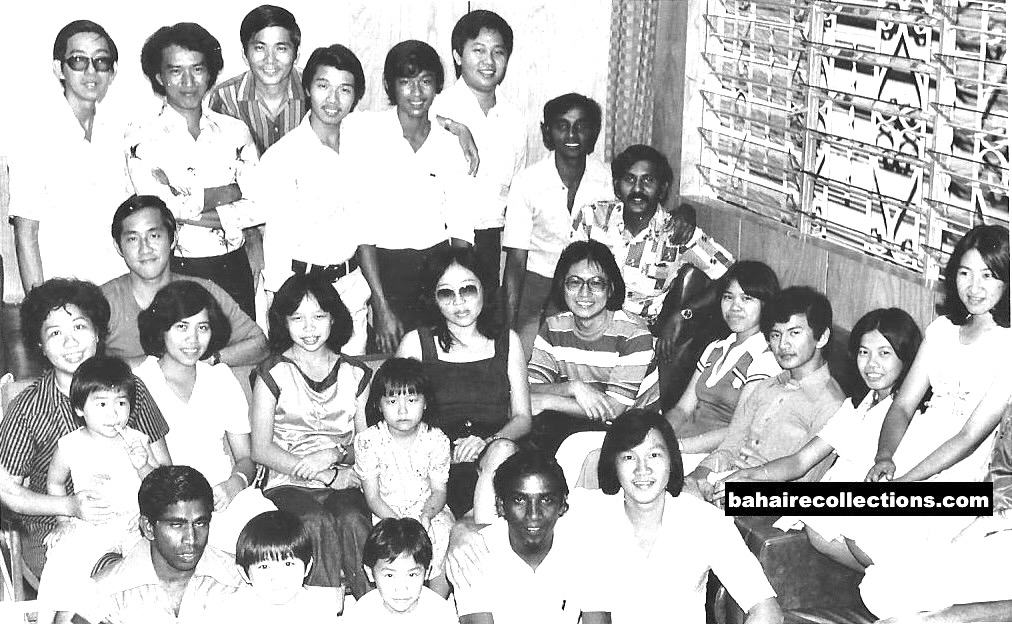
Kuppu, seated front row second from right among friends at the home of Leong Shing Fui in Sandakan, Sabah
Kuppu ended his single life by marrying Miss V. Usharani on 22 August 1982. This marriage produced three wonderful daughters- Lua, Hebe and Grete. He served first on the Local Spiritual Assembly of Kota Kinabalu. From Kota Kinabalu he moved to Putatan, Penampang and served as a member of the Local Spiritual Assembly of Penampang. Kuppu had financial difficulties and adjusted his life according to his means by living the simplest life possible. But the turning point came when his proficiency in languages including English that enabled him to start a tuition centre to teach English language. His tuition centre was called GKS Language Centre. He was very dedicated to his tuition centre which enabled him to provide well for his family. Many of his friends were very happy that Kuppu was doing well in his business. With that he focused on providing the best education for his children. With the tuition centre becoming famous, Kuppu was becoming a known person and was moving in wider circles as well.
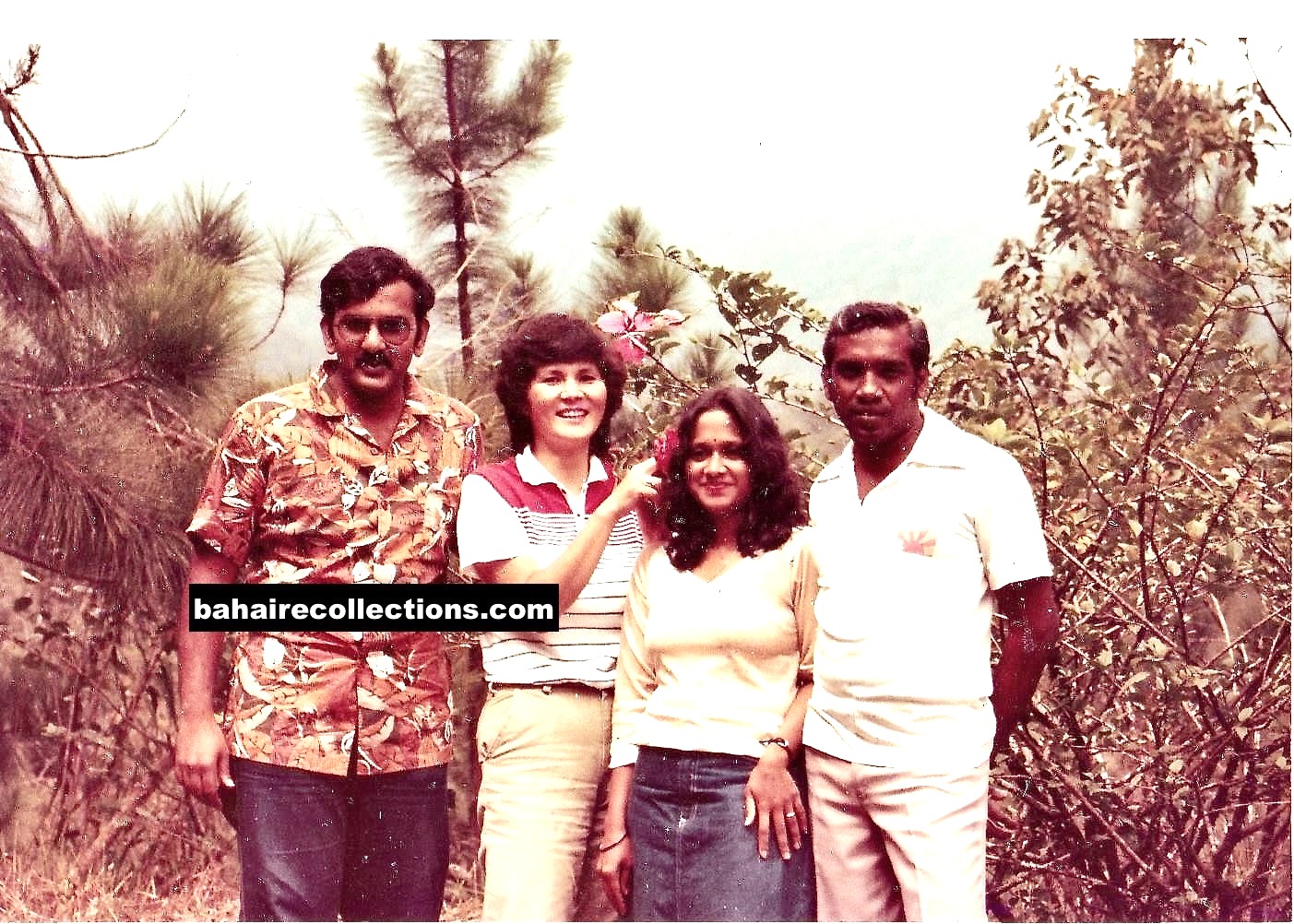
At Kinabalu National Park, 1982 L-R: Dr. Janardhanan, Toyoka Janardhanan, Usharani and Kuppu. Kuppu played a great part in getting the consent from the parents of Dr. Janardhanan for his wedding
HEART IN SARAWAK
Even while in Sabah, the Kuppu who was much remembered and loved by the believers in Sarawak was still invited to visit Sarawak. Kuppu attended a conference in late 1989 in Rumah Nawik in Long Tuyut. M. Maniam and Grete Fozdar had also attended this conference that had gathered more than 1,000 participants, many of whom flocked around Kuppu. At the end December 2002 Kuppu visited Kuching with his family and also dropped in Miri town. Mr. William Lai of Miri brought Kuppu and his family to Bakong where they visited some longhouses and inspired the believers. In Bakong, Kuppu had told Doraisamy, “My wish is still to have my bones buried in Sarawak which has always been my first love.”
Kuppu was last in Kuching with his family in 2003 when he introduced his wife and two daughters to his friends. They stayed for 3 weeks with M. Maniam and his wife Nyamut in their home in Kampong Sungei Tapang. They also went to visit the Fozdars. The two daughters attended a Ruhi course in Kampong Mujat, a Bidayuh community while Kuppu took a trip to Rumah Nawik in Long Tuyut community in Tinjar, an inland area in Miri to meet up with his old friends. The family then returned to Kota Kinabalu.
During the last days of his life, Kuppu was relating to friends about the heroic deeds, sacrifices and services of the early believers in the cradle of the Faith and in Malaysia itself. And he kept mentioning the names of Lily Ng and Firaydun Mithaq who gave him the Faith.Kuppu was moved to read the book Jewel Among Nations which is an account on the history of the Faith in West Malaysia. Kuppu was inspired to start writing his own memoirs, but did not live long to complete it.
On 15 March 2003, Kuppu met with a motor accident and became unconscious when his head hit the windshield. He was first rushed to the General Hospital in Kota Kinabalu and was discharged from there when he seemed fine. Later, he decided to have CT scan done at the Sabah Medical Centre. But he unexpectedly passed away on 31 March 2003 at 10:30 am, at a relatively young age of 56. He was buried in the Kota Kinabalu Chinese Cemetery.
On learning of his untimely passing, messages of condolences came from several corners of the world. Pengulu Maniam from Kuching was among those who flew down for the funeral. A befitting message was sent by Dr. John Fozdar to the National Spiritual Assembly of Sabah on the day of Kuppu’s passing. The message read, “He was loved and remembered wherever he went as he spread the glad tidings throughout Sarawak. He has left behind innumerable admirers and friends in all walks of life and he will be sadly missed. Only recently he came back to service to the Cause he loved so much and for which he sacrificed many years of his life. He was one of the stalwart pioneers to Sarawak and Sabah. He truly has followed the Beloved Guardian’s instructions to ‘Bury your bones where you serve.’ We love him and we miss him.”
The history of the Faith in Sarawak can never be written without mention of some names, and Kuppu’s name shall always be one of them as he had contributed tremendously to the development of the Faith in Sarawak in the 1970s. Kuppu shall always be fondly remembered by innumerable co-workers from all walks of life throughout Sarawak and Sabah for his unreserved sacrifice and services that cannot be erased from the history of the Faith in those states.
Kuppu’s life and legacy are to be well admired and emulated. His only focus and priority in life was to serve his Creator. Throughout his Bahá’í days, life was never comfortable for Kuppu, often meeting many falls, but he always steeled his resolve with the unshakable faith in Baháʼu’lláh. Kuppu had a magnanimous heart all his life. Somehow, he developed feelings for the poor, the downtrodden and the underprivileged. At any opportunity he would give a helping hand to them even if he had to go without meals. And when visiting any homes with children he would not go without some cookies, fruits, cakes, or any gifts for the children, even if he had to borrow some money. He loved the company of children and likewise the children – both Baháʼís and non- Baháʼís loved him very much.
He was loved by one and all for his simple ways, humility, and great ability to liven up at Baháʼí gatherings. He was always a balm to the wounded heart and many a soul sought comfort in him during moments of distress and disturbance. He had the ability to quote the right source of the Baháʼí writings for problems that were taken to him for guidance. His cool and calm face itself was an attraction to many, and it is this serene face that shall flash when we recall him to remembrance.
Thus ended an outstanding life that was well lived to bring gladness to the heart of his Creator through constant and continuous service for the Cause of Baháʼu’lláh.
A. Manisegaran
30 September, 2022
Copyright@bahairecollections.com
You may leave your comments at: info@bahairecollections.com
15 thoughts on “REMEMBERING G. KUPPUSAMY”
After having read this touching recollection of the late Mr. Kuppu, I felt here goes yet another five-star servant of the Blessed Beauty. A wise uncle once shared his thought during our Ruhi class that for each individual soul Bahá’u’lláh has prepared a dedicated chest full of jewels and precious stones in as part of His unfailing protections, blessings and heavenly reward. It is left to the discretion of every believer to pursue it at his own accord—and Mr. Kuppu had just done that in 1966 when his spiritual quest was richly rewarded. That was a great turning point in his life and he had kept the blaze alive till the end of his earthly life. It was woeful that he had winged his flight to the eternal kingdom so untimely and at a relatively young age of 56.
The Gleanings from the Writings of Baha’u’llah comes to our consolation.
O My servants! Sorrow not if, in these days and on this earthly plane, things contrary to your wishes have been ordained and manifested by God, for days of blissful joy, of heavenly delight, are assuredly in store for you. Worlds, holy and spiritually glorious, will be unveiled to your eyes. You are destined by Him, in this world and hereafter, to partake of their benefits, to share in their joys, and to obtain a portion of their sustaining grace. To each and every one of them you will, no doubt, attain.
May his radiant soul has taken refuge within the sheltering protection of the Lord.
With loving Bahá’í Greetings,
Vela Gopal
Phnom Penh
Cambodia
My becoming a Bahai all started on one fateful day in early 1970 when I was first introduced to Kuppusamy by a school mate Lee Cheng Wang. Kuppusamy and Lee came looking for me as they were leisure strolling along the Carpenter Street in Kuching, where I stayed.
That was when I first heard about the Bahai Faith and later Kuppusamy followed up by inviting me to the Bahai Centre at Tabuan Road, a few blocks away from my house. I was given my first Bahai book “The New Garden” in English to investigate. I signed up a month later on 20.3.1970 as I find their gathering to be simple and friendly.
Kuppusamy was a humble and soft-spoken kind soul – so motivated and sincere in bringing me and a few of mine contacts up and getting involved in the many activities. I would say these early young youths are also being nurtured and brought to the Faith in his own unique way of teaching.
I was personally touched by his zeal and energy in his activities and Kuppusamy literally went along well in teaching in schools and picnics. He was at many gatherings- Summer /Winter School, 1970 Singapore Oceanic confab, Hong Kong International Confab 1976.
Kuppusamy brought me along during on my first longhouse teaching trip for about a week during my school holiday at end of 1972. We covered Pantu up to Skrang on a road trip in the 2nd Division, Sarawak. In my life I had never stepped out of my home before and this special experience I enjoyed was really refreshing and interesting – using bus along the main truck road from Kuching to Skrang, Sri Aman. We had to trek mainly on foots along gravel and jungle tracks, stream crossings into the interior of Pantu in order to reach these longhouses for teaching.
There are many cultural shocks I faced settling down into these native background on one occasion during meal time – I literally ate only plain rice as I am not accustomed to their diet of salt and chilies (many of these kampongs are really poor and have nothing better to offer). But I noticed that Kuppusamy would not offend the hosts and he can eat whatever are being laid out on the table. That’s really prove his true character and his simple way of life – mingling and assimilated to these native practices easily . Kuppusamy has a good command of Iban languages and he speaks like one .
Lim Pun Huat
Kuching
Sarawak
Malaysia
I did not have much direct dealings with Kuppu. Yet there were some occasions when we did meet him and I found him to be full of fun and jokes. He loved to have afternoon tea and that’s when he would cracked his jokes to make us laugh.
One remarkable thing about Kuppu was his incredible ability to pick up the Iban language. Like Penghulu Maniam, such was his mastery of Iban that he not only spoke it fluently but also translated a number of passages and prayers from the Holy Writings for the benefit of the local natives. I remember one such occasion when I visited the Bahai Centre in an afternoon, and there he was with a pencil stuck to his ear, trying to do some translation with Maniam, both deliberating which appropriate words to use. It was very inspiring and humbling to see the way both of them exhibiting so much care and love, so intense and absorbed in their deliberations and finally agreeing to the right words.
Beyond this, my interactions with dear Kuppu was limited as he traveled a lot to the interior to teach and consolidate the friends. He, like Maniam, could best be remembered for their legacy of being in love with the Faith, deep in their devotion to serve, sacrificed their best years and endured hardships to teach and consolidate the dear native believers.
Needless to say, their acts of devoted and sacrificial services to the Cause of God left a lasting imprint on my impressionable young mind the meaning of love for the Faith, of humble and devoted service to the Cause of God, and of steadfastness and sacrifice.
Franky Ang
Kuching
Sarawak
Malaysia
Dear Mani
Please continue these inspiring stories. This one makes for goosebumps several times due to the evident presence of the Holy Spirit.
I’ve visited at least sixty nations of the world, all of northeast Asia, most of southeast Asia. almost all of northwest Africa; nearly all of the nations of the South Pacific, including Fiji where Mary, my wife, and I lived for six plus years, etc. Of all of these many nations, Malaysia seemed to be the most spiritual, especially in 1958 following the Continental Conference that had to be moved from Djakarta.
It is easy to predict greatness for that nation and all its citizens.
Professor William Maxwell, Ed.D.
Arkansas
USA
Reading this recollection of Kuppu’s life brings back memories of our youth days in Seremban, Malacca and Kuala Lumpur, Kuching, Miri and Singapore.
I first met Kuppu at the Seremban Centre in 1967 at a youth gathering. We immediately became good friends and when I moved to stay at the Seremban Baha’i Centre in December 1968, Kuppu and I became even closer. We attended the Southeast Asia Bahá’í Regional Youth Conference held at the Malayan Teachers College in Kuala Lumpur in December 1968 together, volunteered to pioneer and attended the Course for pioneers at the National Teaching Institute of Malacca held in February 1969. After the Course we spent time together teaching in the Estates near Seremban and Malacca.
T.Rajan and Stanley Raj from Malacca also became close friends during this period. When I went to work at the National Bahai Centre, again Kuppu was with me assisting the National Assembly with the translations. Then the Asli areas together and then before sailing to Sarawak, spending a month in Singapore.
My good friend Kuppu had an excellent understanding of the Writings, especially after reading them in Tamil. I used to listen in awe when he explains many passages of the Writings. He also had a good voice and sang many popular Tamil songs and would lead many of us to sing. He was “the life of the party” at youth gatherings and at meetings at the Longhouses. He was also fearless and would step up to any stranger and speak about the Faith. There were many times that we would only have some coffee and biscuits and that would take us through the entire day.
But above all, what it takes to go from West Malaysia in the 1960’d and early 70’s and live in Sarawak is steadfastness in the Cause of Baha’u’llah, particularly in the Sibu, Miri and Limbang area with limited roads and days and weeks on boats to visit the Baha’is. Kuppu, Maniam, Bornoh Dass, Ravi Upen to name a few of the many who did it.
Mona and I last met Kuppu in 1996 in Kota Kinabalu and he introduced his family to us. We were happy to see his wife and children. I still remember the good and fun times we had together.
C. Kanagaratnam
Arizona
USA
I met the late Kuppusamy for the first time in Bintulu town when I was travel teaching in Sarawak in early 1978. He was an Auxiliary Board member then and lived in Limbang town. He was a simple, gentle, kind and very high-spirited Baha’i. He had deep knowledge of the Faith and loved to share wonderful stories and events of the Faith. He was able to mingle around easily with friends and strangers of all ages. He loved to sing too. His two favourite songs are ” Gala Rhymes” and a Chinese song ” Ker Ai De Ren Sheng ” meaning ” Lovely Human Living.”
Khor Yip Mou
Kota Kinabalu
Sabah
Malaysia
That was a wonderful and inspiring recollection of the late Kuppusamy. Truly amazing to know the readiness and the spirit of pioneering in youths those early days.
Thank you very much for sharing.
Thangavelu
Kota Kinabalu
Sabah
Malaysia
Dear brother Manisegaran,
Thank you for such a lovely account of the life of dear Kuppusamy. It brings tears to know of the sacrifices he made to serve the Blessed Beauty.These words of Abdul Baha truly fits this great hero of Baha’u’llah.
“O ye homeless and wanderers in the Path of God! Prosperity, contentment, and freedom, however much desired and conducive to the gladness of the human heart, can in no wise compare with the trials of homelessness and adversity in the pathway of God; for such exile and banishment are blessed by the divine favour, and are surely followed by the mercy of Providence. The joy of tranquillity in one’s home, and the sweetness of freedom from all cares shall pass away, whilst the blessing of homelessness shall endure forever, and its far-reaching results shall be made manifest. ….”
Kuppu followed this Path of God.
How did Kuppu play his part in me getting parental consent? He felt that Toyako should dress in sari and then take a photo of her. I duly followed his advise and he arranged everything and we went to take the photo in a studio in Kota Kinabalu. I believe this photo must have changed his mindset.
On our marriage day Kuppusamy’s high spirit, charisma and talent in singing brought great happiness and joy to all present.
Here is a clip;
https://drive.google.com/file/d/1azbWTbDTeFPGUiC7fHBg9idC5WL4S-Sb/view?usp=drivesdk
Thank you dear brother Kuppusamy
Dr. Janardhanan
Wake
Okayama
Japan
I remember Lily Ng and myself giving the Faith to Kuppu on the bus journey which is accurately detailed by the author.
“This is what I have always been thinking about and believed,” said Kuppu while browsing through the pamphlet of the basic facts of the Baha’i Faith. Yes, Kuppu was already a Baha’i in spirit ready to be sparked. He further said, “My family welcomes you and my brother will be delighted to hear of the Message of Baha’u’llah. Will you come to our home and visit my family?” These plain words that radiated from the heart of the young student Kuppu were the words of love and promise that touched our hearts. Not realizing that it was a turning point in the over forty years lifetime of devotion, teaching, and pioneering of Kuppu that roared nonstop till his last breath.
His exemplary life of devotion and sincere services to the Cause of God in various dimensions is a valuable lesson for the young generations to reflect on and emulate. May his radiant soul be blessed to ascend to the highest realms of God.
Kind regards,
Dr. Firaydun Mithaq
Chieng Mai
Thailand
I accepted the Faith while working in Sibu sometimes in Feb. 1978. Thereafter, my life was centred around Baha’i activities. I began to meet many Baha’is. Among them Kuppu.
I first met Kuppu in Sibu probably in one of the regular Saturday firesides held in the Sibu Baha’i Centre. I remember that Sibu had a youthful vibrant community and they loved to sing. Kuppu would always join the group and sang with them..As an Auxiliary Board Member, he used to travel a lot and used to come to Sibu once in a while.
Kuppu had organised a 3 day Spiritualisation Institute near Kapit and a group of us probably 15 of us attended the institute. This could be sometimes after I had become a Baha’i. We took a boat to Kapit and from Kapit we took a smaller boat upstream. A Baha’i from that area had built his wooden house not far from the river in the jungle. It was big enough with rooms to accommodate both men and women. There was no toilet and we had to use sarong to make a temporary toilet for the ladies. The men had to go to the bushes. We took our bath in the nearby river. We took turn to cook the rice and other dishes. Very often, the rice was not well cooked but we enjoyed the fellowship and laughter. There were no electricity and we had to use kerosene lamps in the night. The entire institute was based on Hidden Words. Kuppu facilitated the study of the Hidden Words. We would study, meditate and share our understanding. We stayed for 3 days and we left the institute with high spirits.
I attended the first South East Asia Regional Conference held in Kuching in Dec. 1978 and Kuppu introduced me to our late Counsellor Imbum Chinniah. It was my first time meeting the late Counsellor. He embraced me warmly. He was always full of laughter.
I left for pioneering to South Korea the following year and I returned to Malaysia in Jan. 1980. I had stopped in Kota Kinabalu to see if I could find a job and become a homefront pioneer to Sabah. On the 2nd day, with the help of Victor Wong, I found a job and I stayed on. It was here that I met Kuppu several times. He was a Auxiliary Board Member then. He would come for Summer Schools. It was in 1981 that Kuppu moved to Sabah permanently.
Our dear brother, Manisegaran, had done a very extensive research on Kuppu and thanks to him we are able to see that Kuppu’s Baha’i life is a testimony to our beloved Guardian’s words that
“God works through them and endows them with gifts they did not dream they could ever possess”. Shoghi Effendi, Quickeners of Mankind, p. 67.
For 10 or more long years, Kuppu spent his time with the Iban speaking friends whom he loved very much. It is not easy to travel to the long houses during those days. Often it is by boat and long walks through the jungles. The Iban speaking friends were very hospitable. They would share with their guest whatever food that they ate. Kuppu along with many others had contributed to the building of many vibrant communities in the longhouses. As a result there exist many Baha’i communities in the rural areas. Kuppu left behind spiritual riches. May he be blessed and his family and children and grandchildren be blessed for all his services.
Santhanasamy
Kuala Terengganu
Terengganu
Malaysia
I had the opportunity to travel on few occasion with dear Kuppu. One time in Mukah we walked on foot through a swampy path for more than 3 hours to attend the conference. After the gathering we slept very late. We composed one Iban Song which is similar to English version “We are drops of one ocean.” The next morning we sang together with high spirit and action. Kuppu’s command of the Iban language was excellent and his laughter was contagious as all will join in laughing together with him.
Bundan Liban
Sibu
Sarawak
Malaysia
Dear Manisegaran
Thank you for sharing the story of this beautiful and wonderful soul who pioneered and worked ceaselessly for the Faith in Sarawak. I first met Kuppu during the teaching campaign in Sibu town at the beginning of 1974. Later years, while visiting my parents and family in our adopted hometown of Limbang that I got to know him more. He was a lightning rod teaching in the Ulu Limbang long houses of our indigenous community – teaching activities I did accompanied him a couple of times while he was residing in Limbang town. He knew the Iban language and the nuances of their culture and spoke like the locals. Lots of contributions by Kuppu as told in your story on him and many more still need to be told about his selfless dedication and serving for his chosen Faith in advancing the entry by troops in his relatively short life in Sarawak and Sabah.
Miss you Kuppu. Hope his soul is ever embellished and blessed by Baha’u’llah in the eternal worlds for the wonderful work he has done for this world.
Wellon Leong
Canberra
Australia
I had known Kuppu since I became a Bahai in 1973 after listening to the talk by Yankee Leong in the Dragpn School at Batu 24 Jalan Kuching, Serian. Since then I have had a personal spiritual connection with dear Kuppu. His most outstanding achievement to me was the spiritualisation courses that he conducted. Jenabe Caldwell conducted the courses in Sarawak in 1974 and Kuppu who participated in those courses followed up with similar courses. Looking back I can see that many of the current active believers were the products of the spiritualisation courses. Kuppu also brought the spiritual teachings of the Faith deep into our hearts.
Another aspect was he tried to blend the Iban culture with Bahai teachings. And because of this he was really instrumental in translation services for the Cause. Kuppu used lots of guidance from Shoghi Effendi. I guess that was why I noticed he was much involved in Bahai administration courses and talked about Bahai administration. I personally regarded him as my mento in Bahai Administration. He was also a spiritual brother to me.
How he learned the Iban language and soon mastered it is a mystery to many. Kuppu used to be accompanied by Mr. Sapong Andar, and he will bring one or two Iban youths with him. Sapong was illiterate, but in later part of his life he could read and write. Kuppu always asked him to write teaching reports.
These are some of my thoughts on Kuppu.
Tipik anak Ladi
Kuching
Sarawak
Malaysia
Mani,
Thanks a million for this scrumptious spiritual feast
Reading Mr. Kuppusamy’s extensive, sacrificial, selfless life of service makes one wonder what actually true wealth is all about. He I believe was the richest among us with the love of God in his soul.
I was very fortunate to have associated with this valiant soul from the time I moved to Sabah in 1982 till the last days of his life. Being among the first to receive the sad news of his untimely, shocking passing, I drove with a young Iban youth who was travel-teaching in the interior of Pensiangan (Riban Anak Katik) to the Sabah Medical Centre. We were privileged to carry Mr. Kuppu’s blessed remains in my vehicle to transport to the residence of Mr. Guna’s (EPF Guna) where his body was to be kept for the wake before the funeral.
Very glad to share that that Iban youth later became our late Mr. Kuppu’s son-in-law. And now Mr. Kuppu’s eldest daughter (Lua) who Riban Katik married is walking her father’s earlier path as an Auxiliary Board member serving the friends in the longhouses.
Kang Eng Soo
Kundasan
Sabah
I really thank Mr Manisegaran for bringing out yet another gem in the history of the Faith in Malaysia. I had never known Mr Kuppusamy but after reading his dedicated life story I could feel I had become close to his soul. His marvellous spirit to teach the Faith throughout his life is exemplary.
I was very much interested on how he became a Baha’i. The fact that he was on the bus with Lily Ng and Mr Firaydun cannot be accidental. Kuppu was needed for the service of His Cause and it was, to me, Bahaullah Who had programmed their meeting on the bus. And true enough from the day he accepted the Faith there was no turning back. He went unrestrained as a wind in serving the Cause especially in the field of teaching. Had he stayed on in Malacca as a teacher he would have come up in life on another platform. But he was clear in his mind that there was a greater destiny he had to play- serving the Cause of Bahaullah which he did only too well from what I gather from the story. He seems to have belonged to the valley of poverty throughout his life, but today he is very rich and lives in our history. Kuppu is the kind of stalwart of the Faith in Malaysia who is much needed in abundance.
Nehru Arunasalam
Chicago
USA